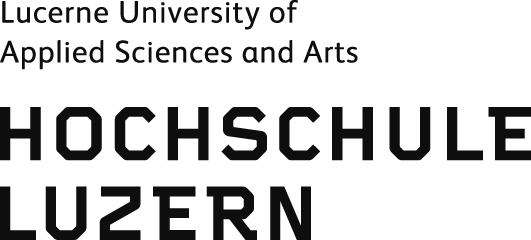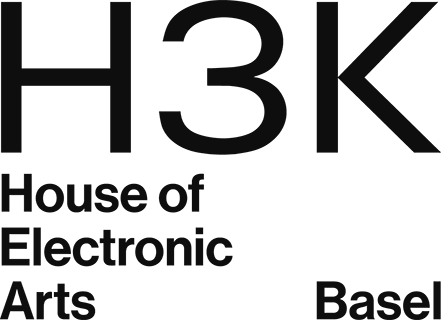13:30 to 17:30 (UTC+2)
Today, digital tools have shifted the relationship between work and author in the implementation of artistic strategies. The images that surround us are no longer subject to authorial control but are autonomous by-products and evidence of our role as communicative participants in contemporary digital society. The online symposium will examine the role of current digital technologies in shaping new forms of authorship and will discuss the capabilities and limitations of this kind of augmented authorship.
In two panels, leading artists, experts and theorists in the field will discuss methods of digital work in which the role of the author is – partly or entirely – expanded and will examine the capacity of artistic practices to investigate the mechanisms of our fragile digital society.
This event is public and free and will be held in English as a Zoom webinar.
The online symposium is organized by the Master of Arts in Fine Arts, Critical Image Practices Major at the Lucerne University of Applied Sciences and Arts – Lucerne School of Art and Design, together with the HeK (House of Electronic Arts Basel).
Digital Strategies for Artistic Collaboration
The digital tools that we now have at our disposal have come to dominate everyday life in the current media landscape and have shifted the relationship between work and author in the implementation of artistic strategies. The lockdown following the COVID-19 pandemic made this all the more evident: the many images that surround us every day seem to pop up in our communication feeds without any involvement on the part of the author; they are no longer subject to authorial control, they seem to be autonomous by-products and, at the same time, evidence of our role as communicative participants, bound up as we are – and this includes artists – in the media-dominated mechanisms of contemporary society.
But the climate of social and technological development in which we live can actually help artists find new strategies of authorship as they examine their own attitudes towards the self-empowerment of image-making and the intentionality of their images. As agents integral to our digital society and the current crisis, artists are inextricably tied up with the images and iterations of images they produce, so they need to rethink their practices and positions. The critically reflective deployment of new technologies is also helpful in the context of critical visual studies, where the parameters of pictorial concepts of perception can be made visible and comprehensible whether they stem from the natural sciences, from the art world, or from everyday life.
Expanding concepts of production to the point where the work, if not self-generating, can be created or at least co-created by other entities will establish new positions as we negotiate prevailing structures – images, art, society – and their limitations.
How does all this give rise to new definitions of authorship? What are the new capabilities and the new limitations of this kind of augmented authorship? How do these new artistic strategies differ from other, analogous conceptual positions and artistic practices?
The digital technologies used in the creation of such works provide some guidance on how to find nuanced answers to these questions. From our communication feeds and the structures of our social media platforms, through data accumulation and blockchain technology to program-controlled design, artificial intelligence, and machine learning, today’s artists – besides virtual forms of spatial expression such as VR and AR – have at their disposal an ever-expanding range of technologies that can be developed for and applied to new forms of empowered, connected and critical authorship.
The Augmented Authorship conference reflects on the role of current digital technologies in the authorship of artistic works. With reference to specific examples, the two parts of the conference consider various aspects of working methods where the role of the author is either partly or entirely expanded:
– Part I considers works involving AI and machine learning
– Part II is concerned with projects that are open ended, process-oriented or network based
Each part of the conference is comprised of a keynote and three to four artistic presentations, followed by a panel discussion and a wrap-up.
The proceedings are set to be published by Diaphanes in early 2022, in the Schriftenreihe 745 series.
Thursday
20 May 2021
from 13:30 to 17:30
Gabriela Christen
Dean of the Lucerne School of Art and Design, Lucerne University of Applied Sciences and Arts (HSLU)
Sabine Himmelsbach
Director of the HeK (House of Electronic Arts)
Introductory Note
Monica Studer/Christoph van den Berg
Lucerne School of Art and Design (HSLU), MFA Programme – Critical Image Practices Major
Panel 1: New Identities
Keynote: Julie Carpenter (13:50)
Artistic Presentation: Keiken (14:20)
Break (14:50)
Artistic Presentation: Protektorama
[fed and cared for by JP Raether] (15:10)
Artistic Presentation: Lauren Lee McCarthy (15:40)
Break (16:10)
Panel Discussion (16:30)
Moderation: Boris Magrini Curator at the HeK (House of Electronic Arts)
Panel Summary (17:10)
Jacqueline Holzer Vice Director at the Lucerne School of Art and Design
Friday
21 May 2021
from 13:30 to 17:30
Panel 2: New Critical-Artistic Strategies
Keynote: Nishant Shah (13:30)Artistic Presentation: !Mediengruppe Bitnik (14:00)
Break (14:30)
Artistic Presentation: Sam Lavigne (14:45)
Artistic Presentation:Tega Brain (15:15)
Artistic Presentation: Lachlan Kermode (Forensic Architecture) (15:45)
Break (16:15)
Panel Discussion (16:30)
Moderation: Sabine Gebhardt Fink Head of the MFA Programme at the Lucerne School of Art and Design (HSLU)
Tancredi Gusman Research Associate at the Lucerne School of Art and Design (HSLU)
Panel Summary (17:10)
Jacqueline Holzer Vice Director at the Lucerne School of Art and Design
Closing Note (17:15)
Artist and Keynote Speakers
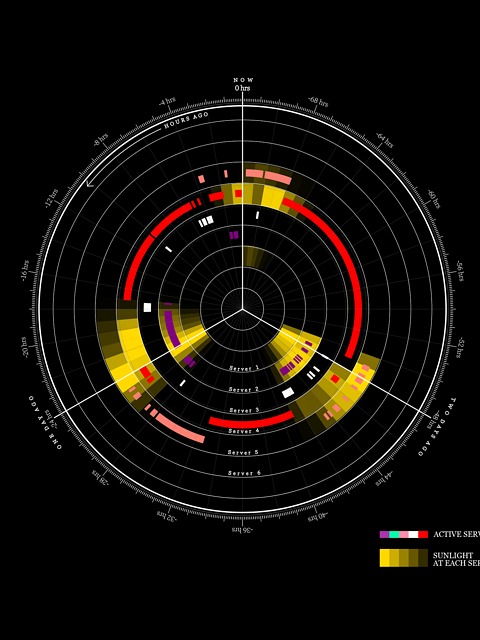
Tega Brain is an Australian-born artist and environmental engineer whose work examines issues of ecology, data systems and infrastructure. She has created wireless networks that respond to natural phenomena, systems for obfuscating fitness data, and an online smell-based dating service. She has exhibited at the Guangzhou Triennial, the Haus der Kulturen der Welt in Berlin, the New Museum, NYC and the Science Gallery in Dublin. Her work has been widely discussed in the press including in the New Yorker, the New York Times, Art Forum and Art in America. Tega is an Assistant Professor of Integrated Digital Media, New York University. She works with the Processing Foundation on the Learning to Teach conference series and the p5js project. She has been awarded residencies and fellowships at Data & Society, Eyebeam, GASP Public Art Park, the Environmental Health Clinic and the Australia Council for the Arts.
Julie Carpenter, PhD, is a research scientist based in San Francisco and a Research Fellow in California Polytechnic State University’s Ethics + Emerging Sciences Group, a non-partisan organization focused on the risk, ethical, and social impact of emerging sciences and technologies.
Her research situates human-technology experiences within their larger cultural contexts and social systems to offer a framework for describing what phenomena are occurring and explain how peoples’ cultural concepts and expectations, behaviors, and ideas adapt and change over time as they work and live with emerging technologies. In her work, Carpenter typically uses ethnographic research methods to explore sociocultural influences on human behaviors that inform topics such as trust, decision-making, and emotional attachment to artificial systems. Visit jgcarpenter.com to learn more about Dr. Carpenter's writings and research or follow her on Twitter @jgcarpenter.
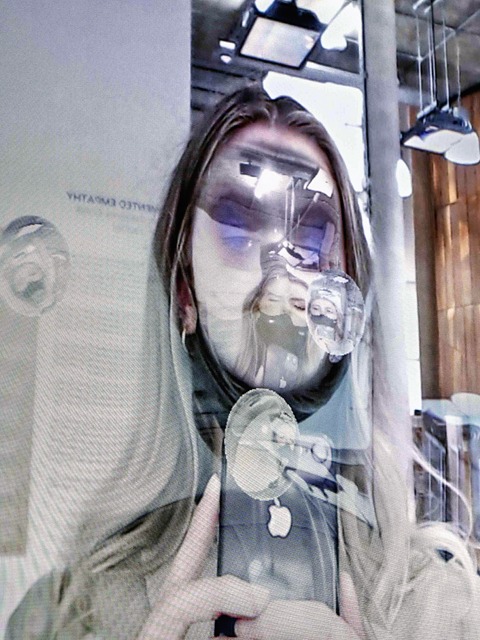
KEIKEN are a collaborative practice, co-founded by artists Tanya Cruz, Hana Omori and Isabel Ramos in 2015, who frequently work with multiple collaborators. Based between London and Berlin, they come from mixed diasporic backgrounds (Mexican/Japanese/European/Jewish). Named after the Japanese word for experience, they create speculative worlds, using moving-image, CGI, gaming software, installation, virtual and augmented reality, programming and performance to merge the physical and digital. Their work simulates new structures and ways of existing, exploring how societal introjection governs the way we feel, think and perceive.
Recent exhibitions and projects include: The Time Complex, Yerevan Biennial, Online; Augmented Empathy, FACT, Liverpool; The Metaverse Womb, 3hd 2020, HAU Hebbel am Ufer, Berlin; Ghosts & Apparitions, Sheffield Doc Fest, Online; Metaverse: We are at the end of something, Mira Festival, IDEAL, Barcelona; Sessions, Block Universe, Online; How to Make a Paradise, Frankfurter Kunstverein, Frankfurt, The Eternal Network transmediale 2020, Haus der Kulturen der Welt HKW, Berlin (2020); Image Behaviour, ICA, London; Jerwood Collaborate!, Jerwood Arts, London (2019).

Lachlan Kermode (Advanced Researcher / Open Source Software), is part of the Forensic Architecture team. He develops full stack architectures, manages machine learning workflows, and handles the grainier details of computer infrastructure across a range of Forensic Architecture’s investigations. He has a degree in Computer Science from Princeton University, and a range of experience both in industry and as a full stack freelancer. Lachlan’s academic interests are generally found in and between computer science, infrastructure studies, and cultural and critical theory. https://forensic-architecture.org.
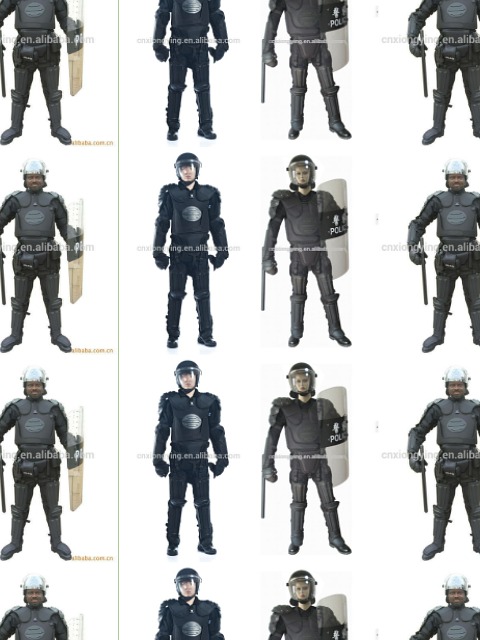
Sam Lavigne is an artist and teacher based in Brooklyn New York and Austin Texas. Lavigne’s artistic practice, which takes the form of both online and physical installations, interrogates the social, political and economic impact of emerging technology, and frequently deals with themes of data, surveillance, policing, and commodification. His recent work includes “New York Apartment”, an exploration of the real estate market commissioned by the Whitney Museum of American Art, and “Get Well Soon” a response to the healthcare crisis in the US, which was named by ARTNews as one of the twenty defining artworks of 2020. He has exhibited at Lincoln Center, Pioneer Works, DIS, Ars Electronica, The New Museum, the Smithsonian American Art Museum, and his work has been covered in the New Yorker, the Washington Post, the Guardian, Motherboard, Wired, the Atlantic, Forbes, NPR, the San Francisco Chronicle, the World Almanac, the Ellen Degeneres Show and elsewhere.
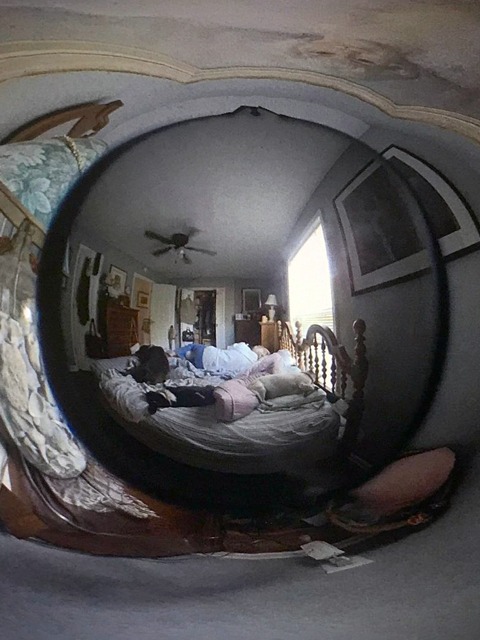
Lauren Lee McCarthy is an LA-based artist examining social relationships in the midst of surveillance, automation, and algorithmic living. She is the creator of p5.js, and Co-Director of the Processing Foundation. Lauren's work has been exhibited internationally, at places such as The Barbican Centre, Ars Electronica, Fotomuseum Winterthur, Haus der elektronischen Künste, SIGGRAPH, Onassis Cultural Center, IDFA DocLab, Science Gallery Dublin, Seoul Museum of Art. She has received numerous honors including a Creative Capital Award, Ars Electronica Golden Nica, Sundance Fellowship, Eyebeam Fellowship, and grants from the Knight Foundation, Mozilla Foundation, Google, and Rhizome. Lauren is an Associate Professor at UCLA Design Media Arts. Find more on her work on http://lauren-mccarthy.com/
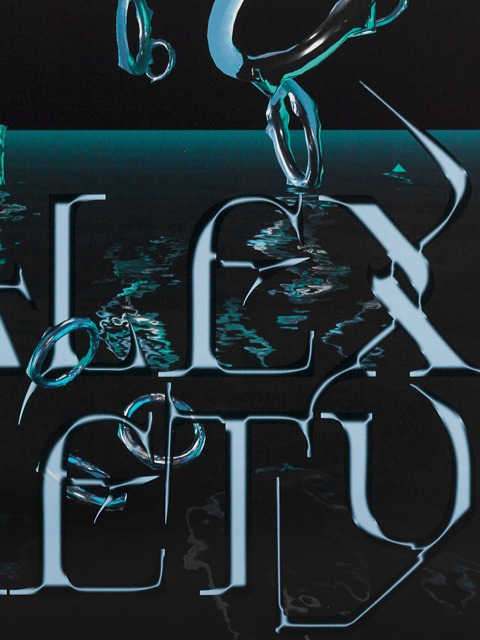
!Mediengruppe Bitnik (read - the not Mediengruppe Bitnik) are contemporary artists working on, and with, the Internet. Their practice expands from the digital to physical spaces, often intentionally applying loss of control to challenge established structures and mechanisms.
In the past they have been known to subvert surveillance cameras, bug an opera house to broadcast its performances outside, send a parcel containing a camera to Julian Assange at the Ecuadorian embassy in London and physically glitch a building. In 2014, they sent a bot called «Random Darknet Shopper» on a three-month shopping spree in the Darknets where it randomly bought items like keys, cigarettes, trainers and Ecstasy and had them sent directly to the gallery space.
!Mediengruppe Bitnik’s works formulate fundamental questions concerning contemporary issues.
Their works are shown internationally, most recently in exhibitions at Museum of Modern Art Moscow, Drugo More, Rijeka, CAC Shanghai, LOAF Kyoto, Hyundai Motorstudio Beijing, Annka Kultys Gallery London and Super Dakota Brussels among others.
They have received awards including Swiss Art Award, PAX Art Award, Prix de la Société des Arts Genève, Migros New Media Jubilee Award, Golden Cube Dokfest Kassel, Honorary Mention Prix Ars Electronica.
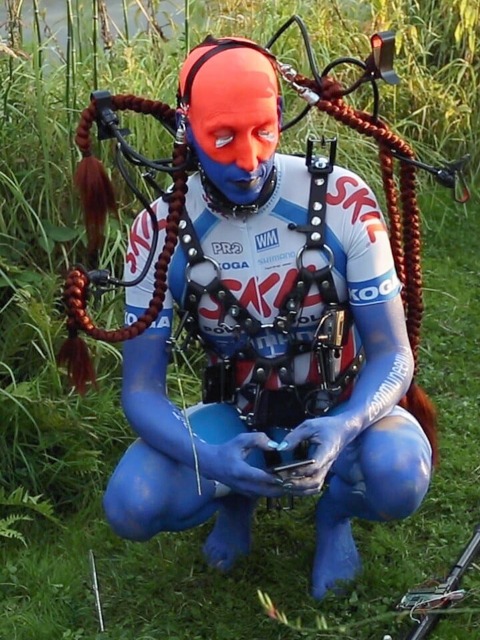
Protektorama [fed and cared for by JP Raether] aLifveForms are bodies of work that explore questions of identity and language constituting reality. In their performative, distributed social interventions, the array of bodies activates a plurality of AlterIdentities engaging an elaborated vocabulary. Organized in a conceptual ‘Identitecture’ the techno-organically sprawling herd of humanoid beings grows through partition, forking, and updates to become a multiplicity of identities. In their appearances, the avatara work to demonstrate that in every common reality the potential for another reality is always present. There are currently three active identities: Transformellae research globalized and industrialized human reproduction. The Swarm-Being traces the transnational circulation of bodies and souvenirs. Protektoramae seek out sites of production of contemporary information technologies, interrogating the relation of the human body to its technological devices. The AlterIdentities are vessels for story drafting, from which photography emerges as derivative, crystalizing the essence of the performative appearances. Their sculptural practice transforms the experience of the AlterIdentities into complex, sculptural-spatial ensembles.
aLivfeForms' work has been exhibited in solo and group exhibitions such as nGbK, Berlin (2020); Museum of Contemporary Art, Toronto (2019); Dortmunder Kunstverein (2019); 6th Athens Bienniale (2018); Kraupa-Tuskany Zeidler (2018); Edith-Russ-Haus, Oldenburg (2017); transmediale Festival, Berlin (2017), Kunstverein Für die Rheinlande und Westfalen, Düsseldorf (2017)(solo); Palais de Tokyo, Paris (2016); 9th Berlin Biennale (2016); Kunsthaus Bregenz (2015); Fridericianum, Kassel (2015); MMK, Frankfurt (2015); District, Berlin (2015) (solo); Kunst-Werke, Berlin (2013).
Their appearances have been presented at Tanznacht, Berlin (2020); PACT, Essen (2019); BAK, Utrecht (2019); Kampnagel, Hamburg (2018); Kammerspiele Munich (2018); Stedelijk Museum, Amsterdam (2017), amongst others.
All of the aLifveForms are currently fed and cared for by J.P. Raether. He attended University of Arts Berlin (1999–2005) and is currently holding a professorship for Artistic Practice in the Public Space at AdBK Nuremberg. He lives and works in Berlin.
Nishant Shah is a feminist, humanist, technologist, working as Director Research and Professor Aesthetics and Cultures of Technology, at ArtEZ University of the Arts, The Netherlands. He is an endowed professor in narrative change practices at the Radboud University and a faculty associate at the Berkman-Klein Centre for Internet & Society at Harvard University, USA. His work is at the intersections of social justice, civil society building, and digital narrative activation through multistakeholder conversations between digital technologies, art and design practice, and social movements and organisation. His new book Really Fake is available in May 2021, with the University of Minnesota Press.
Welcome, Introduction, Panel Moderation and Panel Summary
House of Electronic Arts:
Sabine Himmelsbach is director of HeK (House of Electronic Arts Basel) since 2012. After studying art history in Munich she worked for galleries in Munich and Vienna from 1993–1996 and later became project manager for exhibitions and conferences for the Steirischer Herbst Festival in Graz, Austria. In 1999 she became exhibition director at the ZKM | Center for Art and Media in Karlsruhe. From 2005–2011 she was the artistic director of the Edith-Russ-House for Media Art in Oldenburg, Germany. 2011 she curated ‘gateways. Art and Networked Culture’ for the Kumu Art Museum in Tallinn as part of the European Capital of Culture Tallinn 2011 program. Her exhibitions at HeK in Basel include ‘Ryoji Ikeda’ (2014), ‘Poetics and Politics of Data’ (2015), ‘Rafael Lozano-Hemmer: Preabsence’ (2016), ‘unREAL’ (2017), ‘Lynn Hershman Leeson: Anti-Bodies’, ‘Eco-Visionaries’ (2018), ‘Entangled Realities. Living with Artificial Intelligence’ (2019), ‘Making FASHION Sense’ (2020) and ‘Real Feelings. Emotion and Technology’ (2020). As a writer and lecturer she is dedicated to topics related to media art and digital culture.
Boris Magrini is curator at HeK Basel (Switzerland). He organises exhibitions that foster transdisciplinary dialogues between the arts and the sciences. He regularly publishes on contemporary and media art in magazines, books and exhibition catalogues. Curated shows include Shaping the Invisible World (HeK, Basel, 2021), Entangled Realities (HeK, Basel, 2019), Grounded Visions (ETH, Zurich, 2015–2016), and Mutamenti (Bellinzona, 2007). His book Confronting the Machine (Berlin/Boston: de Gruyter 2017) examines the traditional narratives relating artistic production to technology and the society, while offering an unconventional perspective on digital art. Some of his recent publications include: “(Deep) Media Art and Meme Shaping” in Technologos / Art Medium (Perm: 2019), “Building New Paradigms – A Brief History of Artificial Intelligence and Art” in Entangled Realities (Basel: CMV 2019), “Alternative Visions: Human Futures” in Transdiscourse 2 – Turbulence and Reconstruction (Berlin: De Gruyter 2016), and “Hackteria: An Example of Neomodern Activism” (Leonardo Electronic Almanac Vol. 20, Issue 1, 2014).
Lucerne University of Applied Sciences and Arts:
Gabriela Christen was born in 1961 and grew up in Lucerne, Switzerland. After studies in Art History, French Literature and Philosophy in Basle, Paris, Vienna, Zurich and Berne she worked as project manager and curator at the Swiss National Museum. From 1994 to 1996 she was director of the museums of the canton of Nidwalden. From 1996 to 2009 Gabriela Christen worked as cultural editor at Swiss Radio DRS; from 1999 to 2002 she was deputy editorial director of the culture department. From 1999 to 2009 Gabriela Christen gave lectures at the department of Art & Media at Zurich University of the Arts, furthermore she was a member of the executive team from 2002 to 2007. Since 2009 she was deputy head of the Institute for the Performing Arts and Film at Zurich University of the Arts. She has been dean of the Lucerne University of Applied Sciences and Arts – School of Art & Design since 2010 and is member of the Board of LUASA (Lucerne University of Applied Sciences and Arts) where she is responsible of digitization and for the strategic project “Smart Region Central Switzerland”. She is also a member of the KHKD/CHAD (Conference of the Heads of Art and Design Switzerland).
Sabine Gebhardt Fink is Professor for Contemporary Art and Head of the MFA program at Lucerne University (since 2011). She studied Art History, Philosophy, German Literature and Theatre Studies at the Universities Munich and Basel (PhD-Thesis Transformation of Action, published Vienna 2003). Post-doc at Zurich University of the Arts, 2004-2008. Her research fields are: The Situated Body, Perform Space, Intermedia Conditions/Concrete Poetry, Exhibition Displays, Hermann Obrist, Camp# – artistic education; Performance Chronicle Basel, Participatory Market e.g. Collaborative curatorial work: PreVolving Performance and Art stands with Refugees (UNHCR) 2021. Sabine Gebhardt Fink is board member of Schweizerische Fachgesellschaft fuer Kunstpaedagogik SFKP, author and editor of publications in the fields Art Education, Art in Public Spheres and Critical Image Practices.
Tancredi Gusman is currently Research Associate at the Lucerne University of Applied Sciences and Arts. He led the EU Horizon-2020 project «Between Evidence and Representation: History of Performance Art Documentation from 1970 to 1977» at the Freie Universität Berlin. In 2016 he completed a Post-doctorate at the University of Milan for the EU Project: «Senses: the Sensory Theatre». In 2012 he graduated with a PhD at the University of Napoli «L’Orientale». Various other work includes assistant director and director, dramaturg and curator for theatres and productions in Switzerland, Germany and France.
Jacqueline Holzer works as Vice Director at the Lucerne School of Art and Design and is responsible for Interdisciplinarity and transformation as well as the MA programme in fine arts, the BA programme in fine arts and design education and the foundation course in art and design. Prior to this position, she was head of the BA and MA theatre programme at the Zurich University of the Arts and professor (2013-2020) and Professor at the Institute of Communication and Marketing at the Lucerne University of Applied Sciences and Arts (2003-2013). Her main research interests are cultural studies, sociology of science, digital transformation, the history of linguistic anthropology, innovation and communication.
Rachel Mader is an art researcher. Since 2012 she has directed the competence centre Art in Public Spheres at the Lucerne University of Applied Sciences and Arts. She is responsible both for a number of practice-based research projects on topics like self-organised art spaces, participatory art and city planning, as well as for basic research in the area of artistic research (special focus on the performative research paradigm) and on issues such as art and politics. Rachel Mader is co-president of SARN (Swiss Artistic Research Network), an expert in the Commission of Art in the Public Sphere, Bern (KiöR, since 2014).
Monica Studer/Christoph van den Berg are an artist duo who have been working together in the field of new media and digital art since 1991, hence their interest in new collaborative forms of artistic authorship. They are teaching at the Lucerne University of Applied Sciences and Arts – Lucerne School of Art and Design in the Master of Arts in Fine Art and are responsible for the Critical Image Practice Major. Information on their artistic cv can be found on studervandenberg.ch
Videos will be available as of 10 June 2021
Organisation: Sabine Gebhardt Fink, Tancredi Gusman, Monica Studer/Christoph van den Berg
Concept and Coordination: Sabine Gebhardt Fink, Tancredi Gusman, Monica Studer/
Contact for all press enquiries: Elena Kuznik elena.kuznik@hek.ch
Web design: The Laboratory of Manuel Bürger www.manuelbuerger.com
Web implementation: René Gisler, Lucerne School of Art and Design, Lucerne University of Applied Sciences and Arts
Webinar support: Patric Fasel, Lucerne School of Art and Design, Lucerne University of Applied Sciences and Arts
Assisting Students: Antonia Röllin, Maria Beglerbegovic
IT support: Sandra Heller, Lucerne University of Applied Sciences and Arts
